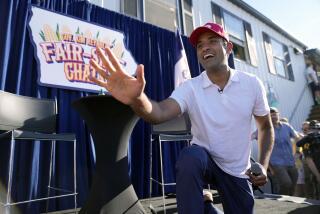NEWS ANALYSIS : Clinton Redoubles Efforts to Create ‘Outsider’ Image
- Share via
LITTLE ROCK, Ark. — It is the marvel of this presidential campaign: People who have spent their adult lives seeking public office have doffed the cloak of experience in favor of a turn as the unfettered new kid on the block.
There is President Bush, peppering his speeches with demands for “change”--but not quite so much change, please, as might presage a change of Presidents.
And there is Bill Clinton, who has wanted to be President since he had pimples, the governor of Arkansas for 10 of the last dozen years, planting his flag in the outsider’s turf.
Consider Clinton on Saturday evening, speaking by satellite to black labor union members gathered in Los Angeles: “A lot of the times in the last 10 years, I felt like an outsider who was working in the system to make it work.”
Or Sunday, outside church here, when he lauded himself as the “least partisan, the most pro-change” of the three probable presidential candidates.
To be sure, Clinton is still seeking to make his case against President Bush. But more and more, Clinton is aiming his self-definition in the direction of independent Ross Perot, the billionaire Texas businessman who is expected soon to announce his bid for the presidency.
Only a few months ago, Clinton owned the image of the outsider, free and clear. He had irked Democrats by pressing for centrist policies and disdaining the traditional party interest groups.
But Perot and the natural rhythms of the campaign have conspired to change this election’s calculus, and now Clinton has to begin anew the work of defining himself.
In fits and starts, he is doing so. Repeatedly in the last few days he has bemoaned both parties’ lack of leadership in Washington.
“Both parties have let us down in Washington,” he told the congregation Sunday in a speech at Little Rock’s Greater Paradise Missionary Baptist Church. “We need to try some new ideas.”
In much the same vein, he has also lamented partisanship--his message seeming to be that he is neither Democrat nor Republican.
“I wish the world could see in this election that it is possible for politics to work the way it ought to work, that it’s possible for people to be committed to one another . . . to join hands and not be too partisan,” he told the congregation.
If claims of being a nonpartisan outsider sometimes sound strange coming from a man who has been governor for a decade, defeating Republicans every two years, it is also essential to his chances for success in November.
Nearly every voter survey taken this year has underscored a desire on the part of voters to shake up the system, an activity that by definition is seen as best accomplished by an “outsider.”
But in order to consolidate his support within his own party, Clinton has had to court the very groups that define insider politics.
In late April, he paid a visit to the same Capitol Hill that he criticizes, seeking the support of Democratic senators and members of Congress who by virtue of office are delegates to the party’s July convention. He has also been courting traditional Democratic power groups like labor.
And, as much as he poses as an outsider, Clinton is simultaneously pointing to his record as governor as proof of his commitment to improving the nation. That distinguishes him from Perot--but underscores the undeniable fact that, in Arkansas anyway, he has been the ultimate insider.
More to Read
Get the L.A. Times Politics newsletter
Deeply reported insights into legislation, politics and policy from Sacramento, Washington and beyond. In your inbox twice per week.
You may occasionally receive promotional content from the Los Angeles Times.











